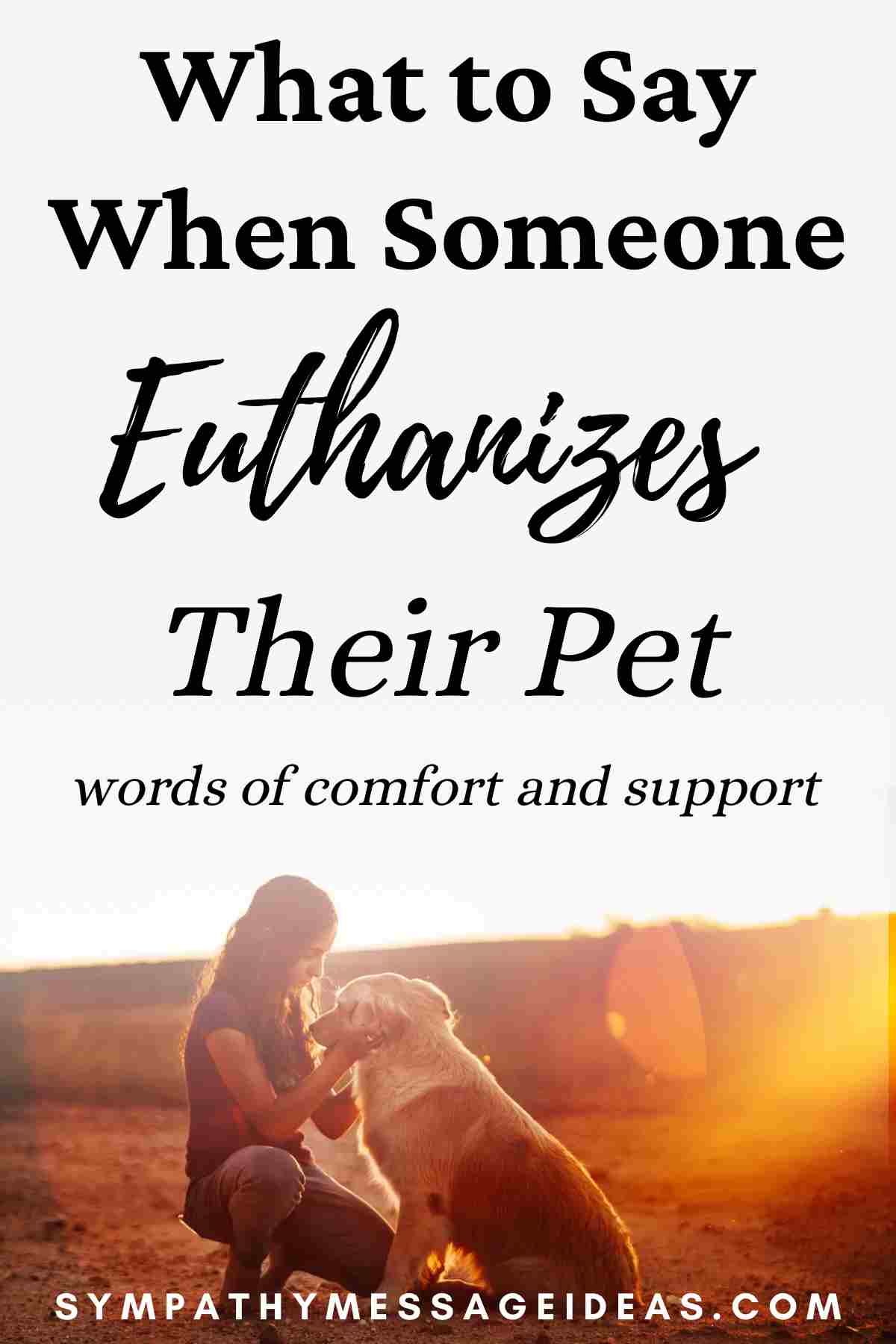Having to euthanize a beloved dog, cat or other pet is incredibly difficult. It’s not just that you’re saying goodbye, something we all know is inevitable, it’s that you have to be the one to make the decision.
Over the years I have had to euthanize two of my cats and a dog due to illness, so I understand how much pain and heartache it brings. Not to mention the agony of giving the go ahead, even when you know it’s the right thing to do.
While it’s not nearly as hard, it is difficult if you want to reach out and offer your support to someone going through this. Knowing the right thing to say is and what to avoid so you don’t cause any additional pain.
So here I will hopefully be able provide you with some tips and suggestions for what to say when someone has to euthanize their pet. My hope is that these ideas will help you to offer comfort and support to a loved one during such an emotional time for them.
What to Say When Someone Euthanizes their Pet
If you just want some examples of things you can say to offer comfort and your condolences then the following should help:
- I can only imagine how difficult it must have been to make that decision. But you did what was best for your pet and they were so lucky to have you as their loving owner.
- It’s heartbreaking to say goodbye to such a loyal and loving companion. Your pet was lucky to have you and no one could have been a better owner than you were. I’m know their memory will live on in your heart. I’m so sorry.
- Pets leave paw prints on our hearts and [pets name] undoubtedly left a lasting imprint on yours. Please accept my condolences and know I’m always here a listening ear whenever you need it.
- My heart goes out to you. It’s such a cruel and terrible decision to have to make but I know you will have done what is best for [pets name]. You will be in my thoughts at such a difficult time.
- You provided [pets name] with a loving home and made his/her life truly special. Don’t forget that. And remember all the happy times you shared together. Hold onto those memories and [pets name] will never truly leave you.
- I’m so sorry to hear about the tragic loss of your pet. I can’t imagine how hard it is to say goodbye under such difficult circumstances. I hope you’re coping pj and if there is anything I can do please don’t hesitate to ask.
- Pets have an incredible ability to touch our lives and become a part of our families. I know your [pets name] was so special to you and I’m here for you during this difficult time.
- Having to say goodbye to a friend like [pets name] is devastating. Please know that you’re not alone and I’m here to support you through this difficult time.
- Losing a pet can feel like losing a part of yourself. Through the grief and heartache I will be here with support in whatever way you need.
- I remember how much joy your pet brought into your life. I hope you can take some comfort knowing they had a wonderful life with you, filled with love and care. Take solace in the memories you shared.
- Pets have ability like almost nothing else to bring happiness into our lives. I’m truly sorry for your loss and want you to know that I’m here for you if you need someone to talk to.

What to Avoid Saying and Doing
Being there for someone who has lost a pet is obviously so important. But you also have to keep in mind what you say and do and how that could inadvertently make things worse.
Minimizing the Loss
For example it’s best not to minimize the loss in any way. Pets are members of the family and so their loss is felt just as strongly.
I know when I lost my pets I have grieved just as much as when I have lost people close to me. If someone had tried to say something like “It’s just a dog/cat/etc.” or “you can always get another one” I would have been upset or annoyed.
Its deeply insensitive and anything like that should be avoid completely.
Don’t be Judgemental
This is very important. If someone has chosen to euthanize their pet it will have been an incredibly hard decision for them to make.
And one not taken lightly. They will have agonized over it or known that it was in their pets best interest.
So if you make judgmental comments or somehow imply they were wrong you are almost certainly going to upset them. Avoid saying anything like “I could never do that” or “that seems so cruel.”
You should instead support their decision and being empathetic to what they have gone through.
Offering Unsolicited Advice
While it may come from a good place offering unsolicited advice can be frustrating or even offensive to someone who is grieving. Having unwanted recommendations or opinions when all you want to do is grieve is not helpful.
I have had friends who do this. I know they don’t mean to be offensive and they mean well but it can be annoying or even upsetting.
So instead of saying something like “you should have tried this treatment” or “you should do this to feel better,” focus on listening and offering support. It will be much more beneficial to whoever is grieving their pet.
Don’t Compare Grief
It’s a bit of a cliche but we all grieve differently. And that means even if you have suffered a similar loss or bereavement comparing yours with someone else’s is never a good idea.
If you do you run the risk of invalidating their feelings and making them feel like their grief isn’t worth as much.
How to Support Someone Who Has Euthanized Their Pet
Listen
Quite often the best thing you can do is just listen. Give the person space to talk about their feelings and experiences. Don’t interrupt or offer advice unless they ask for it.
I leant on friends and family so much when I lost my pets. It was having them there to listen when I needed it that I valued the most.
Knowing I could turn to them and they wouldn’t necessarily make it about themselves or talk endlessly was vital to my getting through the grief. And I’m sure I’m not alone I’m feeling that way.
So if you are aiming to support and help a friend or loved one after they’ve euthanized a pet be there for them and just listen. It will have more of an impact than you realize.
Be Empathetic
Try to put yourself in the shoes of whoever is grieving their pet. You want to understand their perspective and how they are feeling after something as harrowing as euthanizing a pet.
If you can do so then you will be better placed to understand what they’re going through. This in turn will show you support and make them feel comfortable to express their feelings and process their grief.
You can help with this by letting the person know that their emotions are valid and normal. Say things like “it’s understandable that you’re feeling this way” or “it’s okay to be angry/sad/guilty/etc.”
Try to use “I” statements too. Instead of saying things like “you should do this” or “you shouldn’t feel that way,” use “I” statements to share your own thoughts and feelings. For example, “I can’t imagine how hard this must be for you”.
Avoid Cliches
While you may mean well cliches like “time heals all wounds” or “they’re in a better place now” can be deeply hurtful. These sorts of phrases will only make things worse.
Offering Practical Support
As well as offering emotional support you might want to offer practical support to someone who has euthanized their pet. You can help to reduce their stress by taking on task they might otherwise struggle with while they are mourning.
Here are a few ideas:
- Offer to help with arrangements: Euthanizing a pet often involves making arrangements with a veterinarian or animal hospital. You could offer to accompany them to the appointment if they don’t want to go alone or to help with any arrangements.
- Provide meals: when grieving one of the lasts things on your mind is shopping or cooking. So you could offer to do the grocery shopping, bring them some meals or even organize a meal train with other friends or family members.
- Help with household tasks: trying to do the day to day take like laundry or cleaning can feel impossible or overwhelming when grieving. So step in and offer to help with any household tasks and take on some of the burden.
- Offer to pet sit: If the person has other pets that they need to care for you can offer to pet sit for them or help with things like walks and feedings.
These practical gestures can go a long way in supporting someone who has lost their pet. Remember to be specific when you offer to help rather than vague offers like “let me know if you need anything.” This makes it easier for the person to say yes and accept help.
Continuing Support
Grief doesn’t just end after the initial loss. It can last for months or even years.
So it’s important to continue offering support to someone who has euthanized their pet in the days, weeks and months following their loss.
Here are some ways you continue to check in and be supportive:
- Check in regularly: checking in regularly with someone grieving keeps them from feeling like everyone has forgotten. It doesn’t have to be too much. Something as simple as a phone call, text message or just a quick visit. It’s let them know you care and are there for them.
- Offer to listen: the person grieving their pet might not want to talk right away but it’s still good to let them know that you’re there to listen when they’re ready. As we’ve touched on having someone to talk to can be a great comfort.
- Remember important dates: Anniversaries, birthdays and other important dates are sometimes very difficult after you have lost a loved one, including a pet. So make an effort to remember these dates and reach out to the person on those occasions.
- Share memories: if you knew the person’s pet then sharing some of your favorite memories or photos of the pet with them. This is a good way to help them remember the happier times.
Continuing support can be just as important as initial support in helping someone cope with their loss.
Additional Resources
Blue Cross – How to Say Goodbye to your Dog
The Ralph Site – Life After Euthanasia for Bereaved Pet Carers
Related Posts
- Pet Loss Condolence Messages and Quotes
- What to Say to Someone Whose Dog Died
- What to Say to Someone Who is Grieving: A Guide to Giving Comfort


